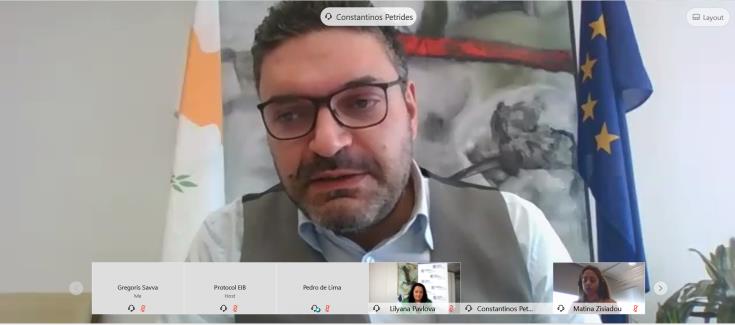Vaccinations are the “main economic tool” for managing the coronavirus crisis and driving prospects of a “strong recovery” in 2021 from 3.5% to 4.5% GDP, said Finance Minister Constantinos Petrides.
He said the pandemic poses an opportunity to reflect on Cyprus’ growth model, address its vulnerabilities and focus on green transition and digitalisation.
Petrides addressed a virtual conference co-hosted by the Nicosia Chamber of Commerce, European Investment Bank (EIB) and Central Bank Governor Constantinos Herodotou.
“It is the first time in modern history, at least in our lifetime, the management and evolution of our economy depend so much on the success of the vaccination programme.
“Vaccination has turned into the main economic tool for managing this crisis, the prospects for recovery,” Petrides said.
“We do expect a strong rebound of about 3.5% to 4.5% depending on the evolution of the pandemic and the great uncertainty which is still out there.”
He said, although companies may have delayed investments in 2020 due to the pandemic, big infrastructure projects are in the pipeline, such as the integrated casino resort and the marinas of Ayia Napa and Larnaca.
“Perhaps there were some delays due to the pandemic, but I am very optimistic, the implementation of all these projects will give a further boost to the economy; they are not factored in our current projections.”
Petrides also said that the EU Recovery and Resilience Facility funds earmarked for Cyprus, totalling €1 billion, will be vital to boosting the Cyprus economy’s resilience.
Herodotou argued that despite the encouraging signals due to vaccine roll-out, 2021 still faces significant uncertainty.
“The crisis provides an opportunity to reflect, reimagine and reset our economy by promoting the right conditions, a greener and more sustainable economy.”
He underscored EIB financing’s importance as Cypriot corporates may face problems in accessing financing because the NPL rate was still high.
“It makes the banks risk-averse because of the possibility of more NPLs impacting their balance sheets.”
Herodotou also highlighted that frequent changes in the foreclosure legislative framework, combined with the slow judicial system, may suggest a comparatively high cost of resolving loan defaults.
“Our current growth model has vulnerabilities, highlighted by the global pandemic crisis; these vulnerabilities pose high risks for Cyprus’ economy, particularly tourism, reputational and geopolitical challenges or legislative uncertainty.”
Lilyana Pavlova, EIB Vice President, said that following an estimated contraction of 5.8% in 2020 due to Covid-19, the Cypriot economy is envisaged to recover by 3.2% of GDP in 2021.
She said growth would be driven mainly by domestic demand.










